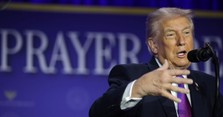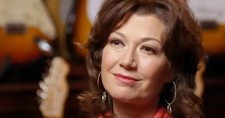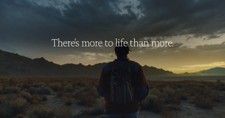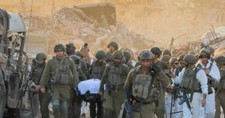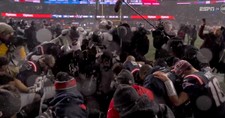
Trending Articles
Recent News
‘Solo Mio’ Is a Creative, Charming, Hilarious, Family-Friendly Rom-Com What the 2026 National Prayer Breakfast Reminded Us Patriots’ Drake Maye Testifies: Helping People ‘Follow Jesus Christ Is What I'm Here for' 15 Family Movies Coming in 2026 to a Theater Near You Is there a True Story to History? Trump Announces $1,000 Newborn Investment Accounts Does Handwriting Still Matter? Sheriff Believes Savannah Guthrie’s Mother Is Still Alive as Ransom Note Is Investigated New ‘He Gets Us’ Super Bowl Ad Targets American Materialism, Points Viewers to Jesus Operation Brave Heart: Bringing Home the Last Hostage from Gaza Impact of America's Negative Net Migration on Ministries This Civilizational Moment
Trending Articles
Recent News
‘Solo Mio’ Is a Creative, Charming, Hilarious, Family-Friendly Rom-Com What the 2026 National Prayer Breakfast Reminded Us Patriots’ Drake Maye Testifies: Helping People ‘Follow Jesus Christ Is What I'm Here for' 15 Family Movies Coming in 2026 to a Theater Near You Is there a True Story to History? Trump Announces $1,000 Newborn Investment Accounts Does Handwriting Still Matter? Sheriff Believes Savannah Guthrie’s Mother Is Still Alive as Ransom Note Is Investigated
Positive Stories
Celebrity
Video
Opinion
Church
Entertainment
Sports

Rams’ Matthew Stafford Goes Viral for 2:30 a.m. Kiss with Sleeping Daughters after Loss
Michael FoustMovies
Politics
Israel
Christian News Headlines - Breaking and Trending Religion News
Crosswalk Headlines - Christian news brought to you by a group of Christian writers and editors who are dedicated to creating a well-rounded look at what’s happening across the globe from a Christian worldview. Our vision is to inform and inspire productive discussion about the current events and online trends that shape our lives, our churches and our world.Crosswalk Headlines includes blog posts about current events and Christian media, breaking news, feature articles, and guest commentaries, many written by respected Christian thinkers.

